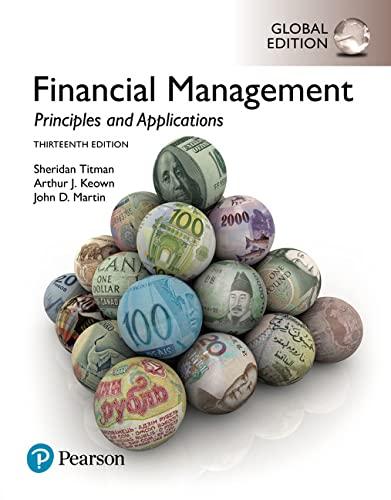Question
3a. Because the down payment of $10,000 and $4,000 is tied up, there is an opportunity cost to giving up the down payment to purchase
3a. Because the down payment of $10,000 and $4,000 is tied up, there is an opportunity cost to giving up the down payment to purchase the house instead of investing it. In the textbook example, they have included this opportunity cost, but only calculated it as simple interest. As we know, returns compound over time, so lets see what the value of these upfront home ownership costs would be if we invested them in stocks instead of purchased the home.
Using an annual rate of return of 7% (no need to divide by 12), calculate the opportunity cost of using $14,000 as the down payment. We will assume Amelia took out the mortgage loan for 30 years.
Hint: Use your time value of money set up and calculate $14k invested at 7% over 30 years
PV: $14,000 N: 30 I: 8%
PMT: $0 (were not adding to it)
FV: ???
How much is the down payment worth after 30 years?
If Amelia had invested her money instead of buying the house, how much would the $14,000 investment make? (Just subtract the starting amount of $14,000 from the ending amount the FV that you calculated). Because we lost the opportunity to make this return, we call this our opportunity cost.
3b. Now lets consider the return from investing in the property. Consider that by the end of the 30 years, the loan will be paid off and the house will have appreciated in value. If the house appreciates at 2% per year, how much will the house be worth after 30 years?
PV: $185,000
N: 30
I: 2%
PMT: $0
FV: ???
In order to calculate the return, we also need to know how much money you put into the investment. So we will consider the total cost of the home as well as the financing costs as our invested amount.
We calculated above that Amelias monthly mortgage amount is $886. If she pays this every month for 360 months, the total cost to pay off the original amount of the loan ($175,000) plus the interest is ___________ ($866 x 360 months)
How much would you make on the house? (Subtract the amount you paid over the life of the loan plus your down payment and closing costs from the appreciate value of the house)
3c. Given your analysis of the numbers above, do you think it would be better to rent or buy a home?
(There is no wrong answer, but clearly and thoroughly explain your reasoning. Really consider the pros and cons of renting vs owning tax implications, effect on your balance sheet, as well as lifestyle and nonfinancial differences between the two and support your decision by weighing the pros and cons.)
Step by Step Solution
There are 3 Steps involved in it
Step: 1

Get Instant Access to Expert-Tailored Solutions
See step-by-step solutions with expert insights and AI powered tools for academic success
Step: 2

Step: 3

Ace Your Homework with AI
Get the answers you need in no time with our AI-driven, step-by-step assistance
Get Started


